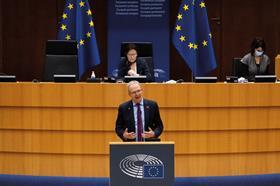Secret deals conducted in the shadows; consumers used as pawns by greedy, profit-seeking entities that masquerade as a force for good. That is the world of litigation funding according to German MEP Axel Voss (pictured).

Voss, a member of the European Parliament’s (EP) legal affairs committee, has been gunning for litigation funders since he published a damning report on the sector in June 2021. Last month, his vision of a fully regulated industry – with a host of controls and restrictions over funders operating in the EU – took a sizeable leap forward when the parliament officially adopted a new version of his report and called on the commission to act on the recommendations within it.
So what would the new EU framework for litigation funding look like? There are three main points.
First, there would be proper regulation by ‘supervisory authorities’. Funders will not be keen on having a regulator breathing down their necks, or the extra cost and bureaucracy that would inevitably entail. But it is hard to argue that self-regulation would be a better option when, if you look at how this has panned out in the UK, so many funders that are active in the market are not even signed up to the Association of Litigation Funders and its code of conduct.
Second, there would be a 40% cap on the amount funders can take from damages. While 40% is not ungenerous – funders tend to charge clients either three times the amount of the funding they provided, or around 30% to 40% of damages – the industry will dislike the lack of flexibility. Pricing depends on risk: the greater the risk, the greater the reward. Yet while third-party funding critics are always keen to shout about excessive profits, they are quieter about the fact that funders receive nothing when a case loses, and may be obliged to pay the opponent’s costs. The client forgoes a chunk of their winnings, but in return they litigate at no risk to their own pocket; and they may be unwilling or unable to litigate otherwise.
The third point is that under Voss’s proposals, claimants will have to tell the court (and therefore defendants) that they are supported by litigation funders. The fact that funders can currently operate unseen, with a huge financial interest in the litigation but no obligation to reveal themselves, certainly makes the industry look murky. But the worry is that defendants will gain an important tactical advantage if they have a right to know when a claimant is using a funder.
Funding does not come cheap, and if a claimant is using it, that may tell the defendant a lot about the claimant’s financial position. It could also influence a defendant’s tactics, with defendants seeking to drive a wedge between funder and client – for example by trying to draw out the litigation when they know a funder would prefer a quicker return on its capital.
While the European Parliament’s proposals aim to protect litigants from being exploited by litigation funders, they do not draw any distinction between ordinary consumers and sophisticated corporate clients. Yet while the 40% cap might be a sensible measure to protect individuals, corporate clients with their own legal advisers do not need that protection – and would no doubt prefer the freedom to negotiate whatever deal they want. If the EU introduces rules that are too restrictive and ultimately uneconomical for funders, the industry will withdraw from the European market. That would be bad news for EU consumers and smaller businesses that lack the financial clout to take on deep-pocketed defendants without financial support.
How will UK litigation be affected by all this? If funding in the EU becomes unattractive, that will only serve to increase the appeal of the booming funding market right on its doorstep, with our relaxed regulatory approach. The UK funding industry is already worth an estimated £2.2bn, and there appears little prospect of our libertarian government stepping in to regulate it in line with the EU.
The relentless growth of UK litigation funding will not carry on forever, however. Macroeconomics may be about to get in the way.
For some years, litigation funding has benefited from an environment in which it has been hard for investors to gain a good enough return on capital through more conventional investments. But times are changing and interest rates are rising. As the investment dynamics begin to shift, the flow of capital into the litigation funding sector may finally start to slow.
Ultimately, global economics could have far more of an effect on the industry than any changes brought about by the Voss report.
Rachel Rothwell is editor of Gazette sister magazine Litigation Funding, the essential guide to finance and costs.
For subscription details, tel: 020 8049 3890, or click here.































2 Readers' comments